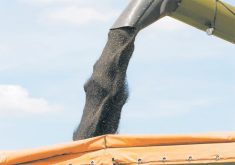SOMETIMES Parliament can soar.
Even in that most partisan of places, MPs sometimes set aside their political prejudices to create policy or articulate visions that transcend to day-to-day and reflect the best of our nation.
Sometimes Parliament can embarrass.
Mired in partisan self-interest or small-minded assumptions, MPs can race to the bottom, articulating “visions” or promoting and approving policies that are an embarrassment to a 21st century nation of decent and caring citizens.
This week may see one of those embarrassing moments.
Read Also

How counter-tariff policy cans Canadian choice
The unavailability of the storied Canadian pickle brand Bick’s, now processed and jarred in the U.S., shows how well-intentioned counter-tariff policy can turn sour on Canada’s consumers and cucumber growers.
On April 4, private member’s bill S-213 is scheduled to have its final hour of debate in the House of Commons and it could be voted on as early as April 7.
Indications are that with the support of most government members, many in the Bloc Québécois and a split Liberal caucus, it will become law.
S-213 would amend the Criminal Code to increase penalties for those convicted of animal cruelty. It would be the first upgrade in the cruelty-to-animals legislation since it was first approved in 1892 when John Thompson, Canada’s short-lived (literally) fourth prime minister was justice minister.
Sadly, it is worse than nothing. It maintains 19th century concepts of human obligations to ensure animal welfare.
S-213 is a setback for the campaign to modernize animal cruelty prohibitions.
Its sponsor, gentle and amiable rural New Brunswick Liberal Charles Hubbard, concedes that it is woefully inadequate but better than nothing and it can be improved upon later.
The political reality, articulated by the Canadian Federation of Humane Societies and some Liberal, New Democratic and BQ MPs passionate about the issue, is that passage of this bill will all but end the debate for years.
It will reduce the pressure. In a parliamentary system where getting on the agenda is more than half the battle, the chance of MPs returning to this issue anytime soon is close to nil if this bill passes.
That would be a shame.
There is an option on the parliamentary agenda, a private member’s bill promoted by Toronto-area MP Mark Holland, that would update the rules in substantive ways and remove the 1892 view that animals are merely property to be used as the owner sees fit, within very narrow limits.
Holland’s bill reflects a consensus worked out in previous Parliaments in which more than half a dozen attempts to modernize the legislation died.
The consensus, forged through emotional committee hearings and compromises, included acceptance by most agricultural groups that animal agriculture could not be targeted as cruel because of the bill.
Meanwhile, the Hubbard legislation is so weak that it would not make illegal a recent cock-fighting ring uncovered in British Columbia.
In Canada, there has been a spate of animal cruelty cases including a dog dragged to its death, starving horses and a cat hung from a street sign in Alberta.
Increasing the penalty a bit is hardly a recognition that this is no longer 1892.
If MPs do not set their sights higher than S-213, they will be massaging the lowest common denominator and kissing goodbye a chance to act decisively on an issue most Canadians embrace.














